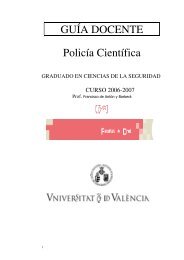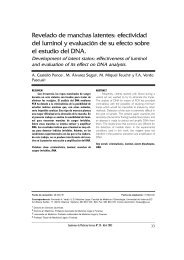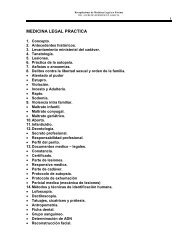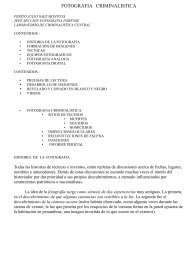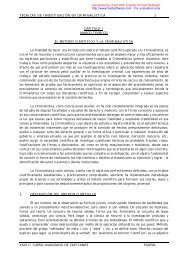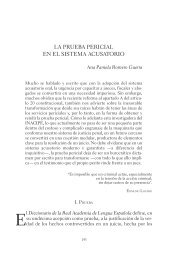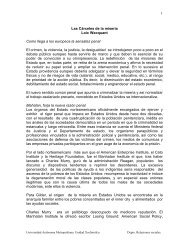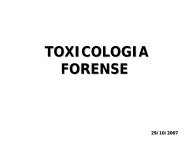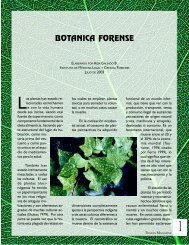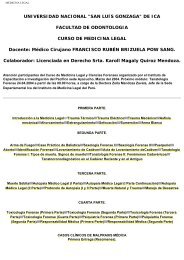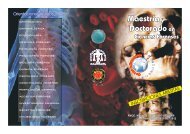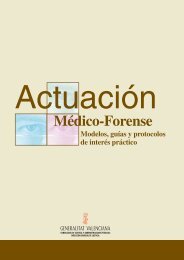- Page 2: SexualMurderCatathymicand Compulsiv
- Page 5 and 6: ForewordWhen I received my doctorat
- Page 7 and 8: with the observation of one individ
- Page 9 and 10: The AuthorLouis B. Schlesinger, Ph.
- Page 11 and 12: Sexual Murder: Catathymic and Compu
- Page 13 and 14: Contents1 Understanding Sexual Murd
- Page 15 and 16: 5 Acute Catathymic Homicides5.1 Var
- Page 17 and 18: 10 Prediction and DispositionRefere
- Page 19 and 20: UnderstandingSexual Murder:Problems
- Page 21 and 22: intercourse, a desire for intercour
- Page 23 and 24: world. Should a murder of this type
- Page 25 and 26: project involving 48 “homicidal s
- Page 27 and 28: of female homicide victims actually
- Page 29 and 30: scene analysis. Psychiatrists and p
- Page 31 and 32: the forensic and clinical psycholog
- Page 33 and 34: • The location of the homicide wa
- Page 35 and 36: Forcible Rape0.8%AggravatedAssault
- Page 37 and 38: Among industrialized nations, the U
- Page 39: Even before Wolfgang’s study, von
- Page 43 and 44: hostage taking, arson, and anonymou
- Page 45 and 46: Melton, Petrila, Poythress, and Slo
- Page 47 and 48: second interview. Methods by which
- Page 49 and 50: the police. When it was pointed out
- Page 51 and 52: The psychologist began her intervie
- Page 53 and 54: When asked why she did not mention
- Page 55 and 56: We believe that these views are too
- Page 57 and 58: up.” “Someone could have hemorr
- Page 59 and 60: The following are examples of the v
- Page 61 and 62: himself (as noted in Example 3). In
- Page 63 and 64: Figure 2.1 Drawings by a sexual mur
- Page 65 and 66: Figure 2.3 Drawings by a young man
- Page 67 and 68: Figure 2.6 Offender’s spontaneous
- Page 69 and 70: Figure 2.9 Drawings by a 13-year-ol
- Page 71 and 72: Figure 2.11girls.Sketches by an 8-y
- Page 73 and 74: Figure 2.13 Sketches by a 13-year-o
- Page 75 and 76: 2.2.4 Bender-GestaltThe Bender-Gest
- Page 77 and 78: tory (CPI), and the Millon Clinical
- Page 79 and 80: sexual attack on a young woman. The
- Page 81 and 82: Table 2.3TermsMalingering(simulatio
- Page 83 and 84: from a neurological disorder, had b
- Page 85 and 86: are in a dissociative state and do
- Page 87 and 88: exonerated through DNA evidence. As
- Page 89 and 90: The Place of SexualMurder in theCla
- Page 91 and 92:
Perhaps the most widely known conne
- Page 93 and 94:
to predict with accuracy (Gibbons,
- Page 95 and 96:
groups. Type A homicides are impuls
- Page 97 and 98:
ased on an analysis of the motivati
- Page 99 and 100:
Thus, in many instances, epilepsy,
- Page 101 and 102:
violence. Unfortunately, the court-
- Page 103 and 104:
suffering thing. I thought if elect
- Page 105 and 106:
cotton underwear. She changed her u
- Page 107 and 108:
3.4.1 Social and Environmentally St
- Page 109 and 110:
men, without overt disturbance or a
- Page 111 and 112:
anger can trigger such murders unde
- Page 113 and 114:
wrapped his wife’s body in a tarp
- Page 115 and 116:
athroom and got a green can of aero
- Page 117 and 118:
and made numerous stab wounds over
- Page 119 and 120:
15-year-old female (A) who lived ab
- Page 121 and 122:
put another coat of paint on and th
- Page 123 and 124:
y underlying conflicts that erupt w
- Page 125 and 126:
Catathymia andCatathymic Crisis:Con
- Page 127 and 128:
effects of encephalitis and various
- Page 129 and 130:
(p. 582). In this and similar cases
- Page 131 and 132:
plexes being at work” (p. 197). M
- Page 133 and 134:
In the 1950s the American people fa
- Page 135 and 136:
NeurosisPsychosisCatathymic CrisisC
- Page 137 and 138:
who dishonors my family. … I don
- Page 139 and 140:
• Stage 2: The latent complex of
- Page 141 and 142:
Eventually, Robert’s idea of cast
- Page 143 and 144:
Robert’s treating physicians who,
- Page 145 and 146:
to prevent a (lower) “fourth orde
- Page 147 and 148:
Finally, the authors found it signi
- Page 149 and 150:
Ruotolo’s findings corroborated t
- Page 151 and 152:
His offenders had unstable families
- Page 153 and 154:
Table 5.1 Similarities between Acut
- Page 155 and 156:
and looked at her and tried to have
- Page 157 and 158:
hated her.” Following the homicid
- Page 159 and 160:
Figure 5.1Drawings by offender who
- Page 161 and 162:
5.2.2 Displaced MatricideConflicts
- Page 163 and 164:
“I asked myself a thousand times
- Page 165 and 166:
that that’s his mom. They have no
- Page 167 and 168:
men, drank to excess and spent chil
- Page 169 and 170:
5.2.3 Sexual MatricideMost acute ca
- Page 171 and 172:
5.3 Differential DiagnosisAcute cat
- Page 173 and 174:
skin picking as an example. But, ra
- Page 175 and 176:
Chronic CatathymicHomicides6The chr
- Page 177 and 178:
homicides are unplanned, while the
- Page 179 and 180:
Raskolnikov’s belief — that by
- Page 181 and 182:
e attacked [by the Americans during
- Page 183 and 184:
offenders. Such opposite notions ar
- Page 185 and 186:
6.3 The Predominance of DepressionO
- Page 187 and 188:
and eventually to a sudden acting-o
- Page 189 and 190:
• Card 3BM. “We have a person h
- Page 191 and 192:
Around the 5th month of the relatio
- Page 193 and 194:
Figure 6.1 Drawings by an offender
- Page 195 and 196:
elieved that, through this decision
- Page 197 and 198:
DD grew up in a working-class famil
- Page 199 and 200:
car in neutral. She yelled for help
- Page 201 and 202:
she came out and said, ‘What’s
- Page 203 and 204:
Mullen, and Alpers (2000) found the
- Page 205 and 206:
Figure 6.3 Deep depression is obvio
- Page 207 and 208:
chosis, a necessary condition to es
- Page 209 and 210:
Table 7.1Differing Uses of the Term
- Page 211 and 212:
meanings, as we have seen. The use
- Page 213 and 214:
anthropos, meaning man.) There are
- Page 215 and 216:
a descriptive — as opposed to an
- Page 217 and 218:
Table 7.2 Characteristics of Contem
- Page 219 and 220:
He concluded that men have an inbor
- Page 221 and 222:
Perhaps one of the most bizarre cas
- Page 223 and 224:
have been sexually motivated, compu
- Page 225 and 226:
tendencies in his youth: “I had a
- Page 227 and 228:
her while she was unconscious but s
- Page 229 and 230:
his trial he told the judge that
- Page 231 and 232:
findings: such offenders “give ve
- Page 233 and 234:
enforcement personnel looking for a
- Page 235 and 236:
Table 7.4Childhood Sexual Experienc
- Page 237 and 238:
The men often selected victims base
- Page 239 and 240:
profile in shocking detail. Not onl
- Page 241 and 242:
years, these and other investigator
- Page 243 and 244:
Some investigators (Godwin and Cant
- Page 245 and 246:
Planned CompulsiveHomicides8Compuls
- Page 247 and 248:
design is for man, who then more th
- Page 249 and 250:
offered from different theoretical
- Page 251 and 252:
manual strangulation (60%), sometim
- Page 253 and 254:
AA denied achieving any powerful or
- Page 255 and 256:
• Card 3GF. “A battered woman.
- Page 257 and 258:
he left one of his tools there, and
- Page 259 and 260:
Additionally, BB had been charged w
- Page 261 and 262:
their breasts exposed and placing t
- Page 263 and 264:
On the Rorschach, CC produced many
- Page 265 and 266:
only to find himself suddenly impel
- Page 267 and 268:
plastics with legs & top tied so th
- Page 269 and 270:
how he slowly drowned her and sat o
- Page 271 and 272:
Figure 8.3 Crime scene photo of wom
- Page 273 and 274:
FF was raised by his mother, whom h
- Page 275 and 276:
uttocks; and over by the wall hung
- Page 277 and 278:
obtained one fingerprint, but becau
- Page 279 and 280:
On Card 13BM, GG said, “somebody
- Page 281 and 282:
Less common cases involve two male
- Page 283 and 284:
UnplannedCompulsiveHomicides9Sexual
- Page 285 and 286:
disorganized speech, as well as neg
- Page 287 and 288:
(Schechter and Everitt, 1996). His
- Page 289 and 290:
a lot of evidence was recovered, in
- Page 291 and 292:
9.3 Nonrecognition of the Sexual As
- Page 293 and 294:
underestimation because some of BB
- Page 295 and 296:
The next case illustrates an offend
- Page 297 and 298:
the bed.” EE described anger towa
- Page 299 and 300:
9.5 Breakthrough of Compulsion with
- Page 301 and 302:
on the stomach. He next burned D’
- Page 303 and 304:
general finding that the vast major
- Page 305 and 306:
9.8 Differential Diagnosis: Catathy
- Page 307 and 308:
would be unable to see them. He tie
- Page 309 and 310:
persistent rejection. The offender
- Page 311 and 312:
When evaluated, KK was reasonably p
- Page 313 and 314:
out the murder in a planned manner
- Page 315 and 316:
perceived “purity” of the wife
- Page 317 and 318:
passive, defensive. It affords a ma
- Page 319 and 320:
Because so many different things mu
- Page 321 and 322:
statistical tables on various situa
- Page 323 and 324:
killing and mutilating a prostitute
- Page 325 and 326:
violence on the basis of an analysi
- Page 327 and 328:
committed homicide in a 5 to 6 year
- Page 329 and 330:
10.1.2.1 Childhood AbuseThe prevale
- Page 331 and 332:
mother contributes to his crimes. T
- Page 333 and 334:
individuals with antisocial and con
- Page 335 and 336:
feathering people and of tying vict
- Page 337 and 338:
ecame friendly with a sadistic dog
- Page 339 and 340:
the (eventual) sadistic murders. An
- Page 341 and 342:
of sadism toward the woman wearing
- Page 343 and 344:
Table 10.3Notorious Sexual Murderer
- Page 345 and 346:
50 and 65% of their sample, as chil
- Page 347 and 348:
lescents. These authors described s
- Page 349 and 350:
Table 10.4Treatment Modalities with
- Page 351 and 352:
were passed to reimburse individual
- Page 353 and 354:
ReferencesAbel, E.L. (1977). The re
- Page 355 and 356:
Berman, A.L. (1979). Dyadic death:
- Page 357 and 358:
Casey-Owens, M. (1984). The anonymo
- Page 359 and 360:
Du Plessix-Gray, F. (1998). In the
- Page 361 and 362:
Freud, S. (1920). Beyond the pleasu
- Page 363 and 364:
Goldstein, R.L. (2000). Serial stal
- Page 365 and 366:
Hazelwood, R.R. and Warren, J.I. (2
- Page 367 and 368:
Kahn, M.W. (1968). Superior perform
- Page 369 and 370:
Levin, J. and Fox, J.A. (1985). Mas
- Page 371 and 372:
Maier, H.W. (1912). Katathyme Wahnb
- Page 373 and 374:
Menzies, R., Webster, C.D., McMain,
- Page 375 and 376:
Naples, M. and Hackett, T.P. (1978)
- Page 377 and 378:
Pope, H.G. (1988). Affective and ps
- Page 379 and 380:
Ressler, R.K. and Schachtman, T. (1
- Page 381 and 382:
Schechter, H. (1989). Deviant. New
- Page 383 and 384:
Simpson, M.A. (1973). Female genita
- Page 385 and 386:
Warren, J., Hazelwood, R.R., and Di
- Page 387:
Zimbardo, P. (1973). Interpersonal




